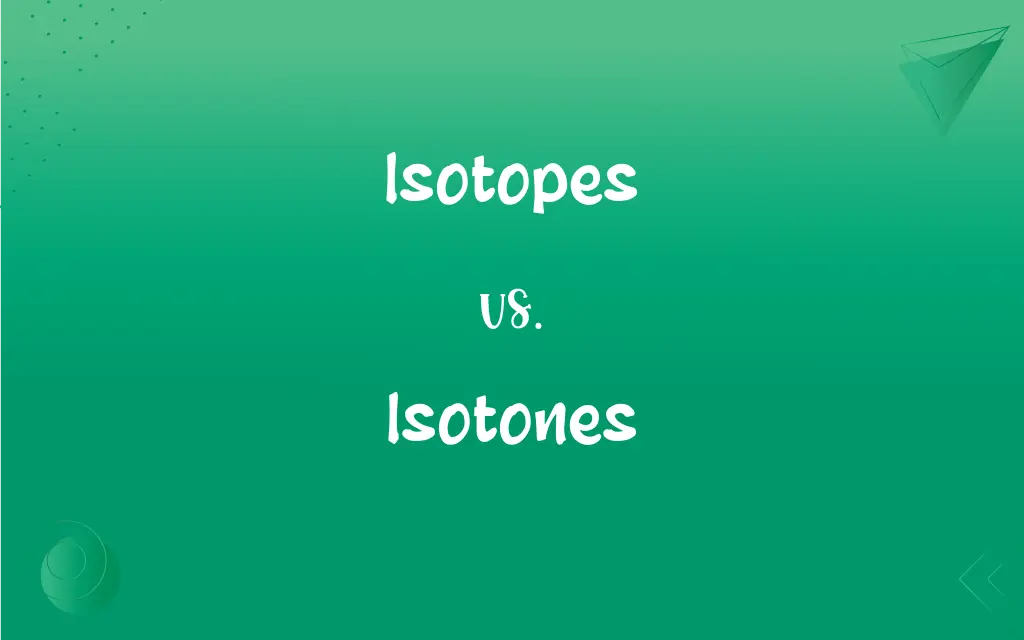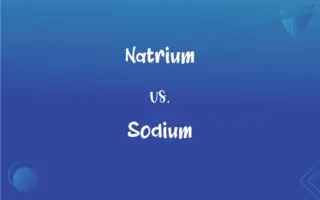Isotopes vs. Isotones: What's the Difference?
Edited by Aimie Carlson || By Janet White || Published on December 20, 2024
Isotopes are atoms of the same element with different numbers of neutrons, while isotones are atoms with the same number of neutrons but different numbers of protons.

Key Differences
Isotopes and isotones are concepts from nuclear chemistry and physics that describe different types of atomic variations. Isotopes are atoms that have the same number of protons but differ in the number of neutrons. This means they are different forms of the same element, sharing the same chemical properties but having different atomic masses. On the other hand, isotones are atoms that have the same number of neutrons but differ in the number of protons. This leads to them being atoms of different elements with varying chemical properties, but they share a common neutron count.
Isotopes are identified by their element name and mass number (like carbon-14), isotones do not have a special naming convention because they span different elements. The significance of isotopes lies in their applications in radiocarbon dating, medical imaging, and nuclear reactors, due to their radioactive properties or differences in mass. Isotones, while less commonly discussed outside of nuclear physics, are important for understanding nuclear stability and reactions.
Isotopes can undergo radioactive decay, changing into other elements or isotopes by emitting radiation, a process that has no equivalent in the concept of isotones. This difference underscores the importance of isotopes in studies of radioactivity and nuclear energy.
Despite their differences, both isotopes and isotones are crucial for the detailed study of atomic structure and nuclear processes. They illustrate the complexity of atomic nuclei and the ways in which neutrons and protons interact to form the diverse array of elements and isotopes found in nature.
Comparison Chart
Definition
Atoms of the same element with different neutrons
Atoms with the same number of neutrons but different protons
ADVERTISEMENT
Atomic Number (Z)
Same for all isotopes
Different across isotones
Neutron Number (N)
Varies among isotopes
Same for all isotones
Examples
Carbon-12 and Carbon-14 (both have 6 protons but different neutrons)
Carbon-14 and Nitrogen-15 (both have 7 neutrons but different protons)
Chemical Properties
Identical among isotopes
Vary among isotones due to different elements
Application/Importance
Used in radiocarbon dating, medical imaging
Important for understanding nuclear stability
ADVERTISEMENT
Isotopes and Isotones Definitions
Isotopes
Some isotopes are stable, while others are radioactive.
Uranium-238 decays slowly, making it useful in determining the age of rocks.
Isotones
Isotones are atoms with the same neutron count but different proton numbers.
Carbon-14 and nitrogen-15 are isotones sharing seven neutrons.
Isotopes
Isotopes are variants of elements with equal protons but different neutrons.
Carbon-12 and carbon-14 are isotopes differing in neutron count.
Isotones
The concept of isotones highlights nuclear structure variations.
Isotones are used to study patterns in nuclear stability.
Isotopes
Isotopes share chemical properties but have different atomic masses.
The radioactive isotope carbon-14 is used for dating archaeological finds.
Isotones
Isotones can belong to different elements, indicating neutron commonality.
Boron-12 and carbon-13 are isotones that illustrate the concept of neutron equality.
Isotopes
Isotopes can be utilized in various scientific and medical applications.
Technetium-99m is employed in nuclear medicine for imaging different parts of the body.
Isotones
Unlike isotopes, isotones do not necessarily share chemical properties.
The study of isotones helps scientists understand nuclear forces.
Isotopes
Radioactive isotopes undergo decay, transforming into other elements.
Iodine-131 is used in medical diagnostics to assess thyroid function.
Isotones
Isotones are important for nuclear physics and chemistry research.
Exploring isotones offers insights into the behavior of neutrons in the nucleus.
Isotopes
One of two or more atoms having the same atomic number but different mass numbers.
Isotones
One of two or more atoms whose nuclei have the same number of neutrons but different numbers of protons.
Isotopes
Plural of isotope
Isotones
Plural of isotone
FAQs
Can isotopes of an element have different chemical properties?
No, isotopes of an element share chemical properties because they have the same electron configuration.
What are isotones?
Isotones are atoms with the same number of neutrons but different numbers of protons.
Do isotones have applications similar to isotopes?
Isotones are more relevant in nuclear physics research, particularly in understanding nuclear stability and reactions.
What are isotopes?
Isotopes are atoms of the same element with different numbers of neutrons.
How do isotopes differ from isotones?
Isotopes vary in neutron number but share proton count, while isotones have the same neutron number but different proton counts.
Why are isotopes important in science and medicine?
Isotopes are used in radiocarbon dating, medical diagnostics, and nuclear reactors due to their unique properties.
Are all isotopes of an element naturally occurring?
Not all; some isotopes are naturally occurring, while others are synthetically produced in laboratories.
How does the concept of isotones differ from isobars?
Isotones have the same neutron count, while isobars have the same atomic mass but different numbers of protons and neutrons.
How do isotones contribute to our understanding of the atomic nucleus?
Isotones offer insights into neutron behavior and nuclear force interactions within the nucleus.
Can isotopes change into other isotopes?
Yes, radioactive isotopes can decay into other isotopes or elements by emitting radiation.
Can isotopes be radioactive?
Yes, some isotopes are radioactive and can decay into other elements or isotopes.
What makes isotones significant in nuclear physics?
Isotones help scientists understand the interactions and stability of neutrons in the nucleus.
What is an example of a medical application of isotopes?
Technetium-99m, used in diagnostic imaging to visualize organs, is an example of a medically important isotope.
How are isotones identified?
Isotones are not identified by a unique naming convention but by specifying their neutron count alongside their element name.
Can isotopes be separated by chemical means?
No, isotopes cannot be separated by chemical means due to their identical electron configurations.
What role do isotopes play in nuclear reactors?
Certain isotopes, like uranium-235, are critical for nuclear fission reactions in reactors.
Why are isotopes critical in archaeological studies?
Isotopes like carbon-14 are essential for dating organic materials in archaeological sites, providing insights into historical timelines.
Are isotopes used in environmental science?
Yes, isotopes are used in tracing environmental processes and studying climate change.
What is the importance of stable isotopes?
Stable isotopes are used in research, medicine, and industry without the risks associated with radioactivity.
How do isotones affect the properties of elements?
While isotones themselves do not affect chemical properties, they are important for nuclear properties and stability.
About Author
Written by
Janet WhiteJanet White has been an esteemed writer and blogger for Difference Wiki. Holding a Master's degree in Science and Medical Journalism from the prestigious Boston University, she has consistently demonstrated her expertise and passion for her field. When she's not immersed in her work, Janet relishes her time exercising, delving into a good book, and cherishing moments with friends and family.
Edited by
Aimie CarlsonAimie Carlson, holding a master's degree in English literature, is a fervent English language enthusiast. She lends her writing talents to Difference Wiki, a prominent website that specializes in comparisons, offering readers insightful analyses that both captivate and inform.



































































